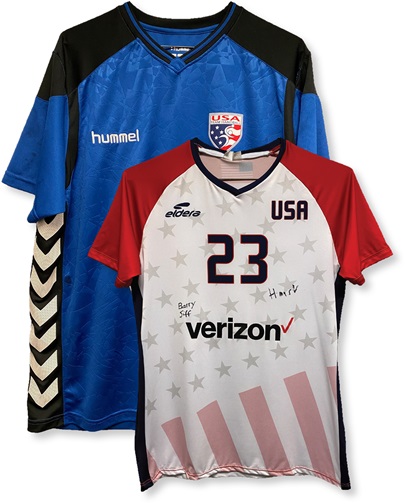Verizon is one of America’s biggest marketing spenders, and the buzz fueled by its 10-figure marketing budget is even more pronounced within sports. When we tell you that a company with more than $127 billion in revenue is making a six-figure marketing investment to affiliate itself with a national governing body, you might giggle.
If we added that it is the NGB for one of the three Olympic sports in which the United States has never medaled, that might even turn into a chuckle.
PRESS RELEASE: USA Team Handball Announces Founding Partnership With Verizon
Still, there is a reason behind Verizon’s decision here, and it’s not just because CEO Hans Vestberg also chaired that particular sport’s NGB in his native Sweden for nine years, before he served as president of the Swedish Olympic Committee.
It’s a team sport popular in Europe; it was first played at the 1936 Olympics; and it has been an Olympic sport since 1976.
We’re talking about team handball, a hybrid of soccer and basketball in which seven-person teams try to throw a ball slightly smaller than a volleyball into goals. While the International Handball Federation claims there are 27 million people playing the sport worldwide, it is largely unknown in the U.S. As a new sponsor of USA Team Handball, Verizon is hoping to put the sport on the map domestically. Its rights deal (a one-year agreement with options to go through 2024) will put the Verizon logo on the front of the NGB’s uniforms, and grant the communications giant a “Founding Technology and Content Provider” designation, through which it hopes to grow the sport. New sponsor dollars are always impressive; having the NGB’s first non-endemic sponsor is a revelation.

As part of its deal Verizon will have its logo on the team’s uniforms. “Verizon’s a legitimizer for the sport of team handball, it’s as simple as that,” said Barry Siff, who became CEO of USA Team Handball last April, after five years as president of USA Triathlon. “One of our goals is to build an OTT and have more social media running, so Americans can sample our sport. I know Verizon can help us grow with their content and distribution capabilities.”
Even when your leading patron is the CEO of a company as large, far-reaching, and influential as Verizon, that won’t be easy. “Tremendous upside and minimal risk” is how Rob McQueen, Verizon director of sponsorships, described the deal. “We’ll get involved in national team tryouts, grassroots tryouts for the women’s and men’s national teams, along with the beach version of the game,” he said. “We think we can grow the sport by getting younger athletes to try something new.”
Not only has the U.S. never won an Olympic medal in team handball (the other Summer Olympic events it has been shut out of are table tennis and badminton; when you win a bar bet at your local tavern, thank us), it hasn’t even qualified for Olympic competition since 1996, when it got free admission because the Games were held in Atlanta. The good news: It will receive that same home-court pass for the 2028 Summer Games in Los Angeles. And with a budget the size of Verizon’s, it’s worth wondering if team handball will serve as a test for a larger NGB play.
“This was, perhaps, the ultimate ground-floor opportunity,” said Jeff Marks, whose L.A.-based Innovative Partnerships Group is USA Team Handball’s sales and marketing agency. “The vision is one of building, while knowing the U.S. team will have a presence in eight years.”
With few people playing team handball in the U.S., Siff knows the sports must be nurtured at all levels, from grassroots — where he says there is a growing club scene in major U.S. cities — to the formation of an American professional team handball league, a project now under R&D at IOA Sports in Orlando, where former Major Indoor Soccer League executive Paul Garofolo says it reminds him of his early days with that startup. While the new league is yet nameless, and has no completed logos, he expects to be pitching prospective owners before the year is out. Garofolo says it will require a minimum of 10 franchises to launch for a league that would begin play in 2023 with each franchise costing $3 million to $5 million to launch.
Likely prospects? “NBA or NHL owners in one-tenant arena situations,” Garofolo said. “Some of the big European sports brands like Barca or Paris Saint-Germain also have their own team handball teams.”
It may just be a matter of finding the right CEOs.
Source:
bit.ly/2TF94hl